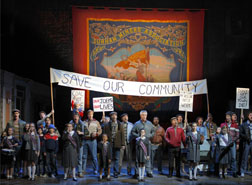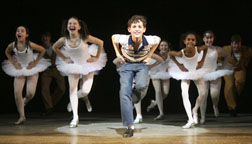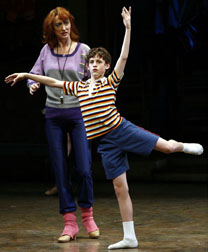By Lucy Komisar
As U.S. workers are fired by corporate executives who take multi-million-dollar bonuses, Billy Elliot, The Musical seems made to order for the current American stage. It is a call for solidarity against those in power. It‘s a very British class-conscious play, with workers raising their fists to a giant puppet of 1980’s Prime Minister Margaret Thatcher. It also tells a universal truth that political struggles must also defend personal freedom.

This stirring musical — book and lyrics by Lee Hall, music by Elton John, directed by Stephen Daldry and based on Hall’s 2000 film – takes off in 1984 when Thatcher, a conservative whose sharp features in video clips evoke a story-book Wicked Witch, has decided to close Yorkshire coal mines that had been nationalized after World War II. Some 200,000 men will be thrown out of work; they go on strike.
That sets up a monumental clash between the workers, the Tory government, and their surrogates, the police. In real life, the strike would last a year, and the mine workers and their union would be smashed. The analogy for Americans might be the Ronald Reagan’s destruction of the air traffic controllers union, but there was never a U.S. protest movement to match that of the British coal workers.
Hall has penned a realistic reprise of the story. The production is invigorating and inspiring, and the cast is multi-talented. With songs, slogans and banners, the miners demand, Save our community; save our pit.” Solidarity, solidarity, solidarity forever! is a refrain repeated through the play. They make it clear, We’re proud to be working class. In stylized dances, they confront the organized violence of the police. Think Waiting for Lefty set to music and dance.
The workers’ lyrics are bitter:
They‘ve come to raid your stockings
And to steal your Xmas pud.
But don‘t be too downhearted.
It‘s all for your own good.
The economic infrastructure
Must be swept away
To make way for business parks
And lower rates of pay.

Parallel stories deal with the need for personal expression. Billy (Trent Kowalik, in the production I saw), is an 11-year-old miner’s son who wants to be a dancer. Using money his father gives him for boxing lessons, he secretly joins a girls’ ballet class.
The dance instructor, Mrs. Wilkinson (a gritty, cynical, but sensitive and very appealing Haydn Gywnne), sees Billy’s promise and forces him to work to achieve it. Billy, Wilkinson and the class piano player, Braithwaite (Thommie Retter), do a joyous We were born to boogie, a highlight.
Billy’s dad (Gregory Jbara) and the other men don‘t like it his dancing. Nevertheless, though they are scrounging on strike-pay pennies, the miners’ families dig into their pockets to find the cash for Billy’s fare to a Royal Ballet audition.
The message to Britain’s workers is that freedom is indivisible.
There‘s strong feminism here, too. Billy is being raised by his grandma (Carole Shelley), who has contempt for the drunken men of her society, especially her late husband. She sings:
I hated the sod”for thirty-three year.
We should never have married, of that I‘m quite clear.
He spent the housekeeping money on whisky and beer
And never lifted a finger.
Her lesson is:
If I went through my time again, Oh, I‘d do it without the help of men….
If I‘d only known then what I know now, I‘d have given them all the finger!
One of Billy‘s friends likes to dress up in satin and lace, earrings, mascara, and high heels. Maybe there‘s a bit of Elton John in here.

The vivid dance numbers to John’s foot-tapping sound and lively, jazzy choreography by Peter Darling, are sometimes surreal: a confrontation between strikers and cops – the police moving in line with plastic shields and banging clubs — is mixed with kid ballet dancers.
Another high point – there are many — is the Merry Christmas, Maggie Thatcher number in which the kids, with Thatcher masks, sing an outrageous song mocking the prime minister and celebrating that it’s one day closer to your death! The bit includes a tank with a British flag, a giant Thatcher puppet, and the lyric that They’re privatizing Santa.
A few things I didn’t like: the schmaltzy relationship between Billy and the ghost of his dead mother (Leah Hocking). And the gimmicky Swan Lake in which Billy, dancing with an older alter ego, flies around on a cable that takes him high in the air. That’s not dancing!
After the longest strike in British history, the miners were beaten. But as they march onstage under a banner trumpeting the emancipation of labor, they declare that defeat is only temporary.
We saw a land where wealth was shared
Each pain relieved, each hunger fed.
Each man revered, each tyrant killed
Each should redeemed, each life fulfilled.
From each man‘s means to each his need
We saw a time man would be freed.
We fought for all the things we saw.
The battle‘s lost but not the war.
It may be a message for some in their American audience.
“Billy Elliot, The Musical.” Book and lyrics by Lee Hall. Music by Elton John. Directed by Stephen Daldry. Choreography by Peter Darling. Imperial Theatre, 249 W. 45 Street. 212 -239-6200. Opened Nov 13, 2008. Reviewed by Lucy Komisar Nov 20, 2008. http://billyelliotbroadway.com/
Review on NY Theatre-Wire site.

